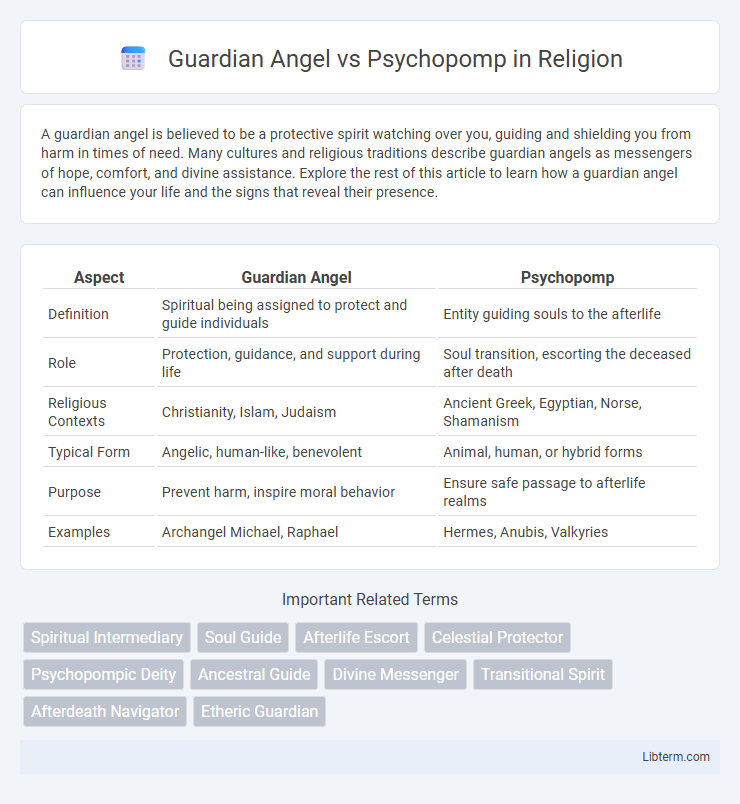A guardian angel is believed to be a protective spirit watching over you, guiding and shielding you from harm in times of need. Many cultures and religious traditions describe guardian angels as messengers of hope, comfort, and divine assistance. Explore the rest of this article to learn how a guardian angel can influence your life and the signs that reveal their presence.
Table of Comparison
| Aspect | Guardian Angel | Psychopomp |
|---|---|---|
| Definition | Spiritual being assigned to protect and guide individuals | Entity guiding souls to the afterlife |
| Role | Protection, guidance, and support during life | Soul transition, escorting the deceased after death |
| Religious Contexts | Christianity, Islam, Judaism | Ancient Greek, Egyptian, Norse, Shamanism |
| Typical Form | Angelic, human-like, benevolent | Animal, human, or hybrid forms |
| Purpose | Prevent harm, inspire moral behavior | Ensure safe passage to afterlife realms |
| Examples | Archangel Michael, Raphael | Hermes, Anubis, Valkyries |
Understanding Guardian Angels: Definition and Origins
Guardian angels are spiritual beings believed to provide protection, guidance, and comfort to individuals throughout their lives, rooted in Christian and Jewish theological traditions. The concept originates from biblical scriptures such as Psalm 91:11 and Matthew 18:10, which mention angels assigned to watch over and deliver people from harm. Unlike psychopomps, whose primary role is to escort souls to the afterlife, guardian angels focus on ongoing life support and personal spiritual growth.
The Role and Purpose of Psychopomps
Psychopomps serve as spiritual guides who escort souls between the realms of the living and the dead, facilitating safe passage during the transition after death. Unlike guardian angels, whose primary function is to protect and watch over individuals during life, psychopomps ensure that the deceased reach their appropriate afterlife destination according to cultural or religious beliefs. These entities often appear in diverse mythologies as animals, deities, or supernatural figures, underscoring their critical role in the cosmic order and the cycle of life and death.
Key Differences Between Guardian Angels and Psychopomps
Guardian Angels serve as personal protectors and guides, offering spiritual support and assistance throughout an individual's life. Psychopomps are supernatural beings or entities responsible for escorting souls to the afterlife, facilitating the transition from life to death. Key differences include their primary roles--Guardian Angels focus on ongoing life protection, while Psychopomps specialize in guiding souls after death--and their display in various religious and mythological traditions.
Historical Perspectives on Guardian Angels
Historical perspectives on guardian angels trace back to ancient religious texts, including the Book of Tobit in the Apocrypha, which depicts angelic beings assigned to protect individuals. In Christian theology, guardian angels serve as personal protectors and guides, a belief formalized by Church Fathers such as St. Jerome and St. Augustine. Unlike psychopomps, who are traditionally seen in various mythologies as guides escorting souls to the afterlife, guardian angels emphasize ongoing spiritual guardianship throughout a person's life.
Psychopomps in Mythologies and Religions
Psychopomps are spiritual guides that escort souls to the afterlife across various mythologies and religions, including Anubis in Egyptian myth, Hermes in Greek tradition, and Valkyries in Norse beliefs. These entities play a crucial role in ensuring safe passage from the mortal world to the realm of the dead, often symbolizing transition and transformation. Unlike guardian angels, who protect individuals through life, psychopomps specifically manage the journey of the soul after death.
Symbolism Associated with Guardian Angels
Guardian angels symbolize divine protection, guidance, and comfort, often depicted with halos, wings, and a gentle presence signifying spiritual guardianship. They embody purity and benevolence, representing an ever-watchful force ensuring safety and moral support throughout an individual's life. In contrast to psychopomps, who guide souls after death, guardian angels focus on ongoing protection during the living journey, highlighting themes of celestial care and unconditional love.
Common Traits of Psychopomp Figures
Psychopomp figures, much like guardian angels, serve as spiritual guides who escort souls to the afterlife, ensuring safe passage between worlds. These entities often appear across cultures as benevolent beings associated with death, transition, and protection during the soul's journey. Both guardian angels and psychopomps share themes of guidance, protection, and spiritual mediation, underscoring their roles in facilitating the soul's transition and offering comforting presence during metaphysical shifts.
How Cultures Interpret Afterlife Guides
Guardian angels in Western traditions are often perceived as personal protectors assigned at birth, ensuring spiritual safety and guiding moral decisions. Psychopomps, prevalent in ancient Egyptian, Greek, and Indigenous mythologies, act as escorts facilitating the soul's journey from life to the afterlife, emphasizing transition rather than constant presence. Cultural interpretations of afterlife guides vary widely, reflecting beliefs about death, the soul, and the universe's structure.
Personal Encounters: Guardian Angel Stories vs Psychopomp Experiences
Personal encounters with guardian angels often involve protective presence during danger or guidance through difficult life decisions, highlighting a nurturing and watchful role. Psychopomp experiences, in contrast, typically occur at moments of death or near-death, where the figure serves as a guide escorting the soul to the afterlife, emphasizing transition rather than ongoing protection. Narratives of guardian angels frequently emphasize comfort and reassurance, while psychopomp stories focus on the boundary between life and death, underscoring their distinct spiritual functions.
Choosing Your Spiritual Guide: Angel or Psychopomp?
Choosing your spiritual guide involves understanding the distinct roles of a Guardian Angel and a Psychopomp. Guardian Angels focus on protective guidance, offering emotional support and safeguarding your well-being throughout life's challenges. Psychopomps specialize in guiding souls through transitions, especially during death or spiritual transformations, facilitating passage into the afterlife or new realms.
Guardian Angel Infographic

 libterm.com
libterm.com